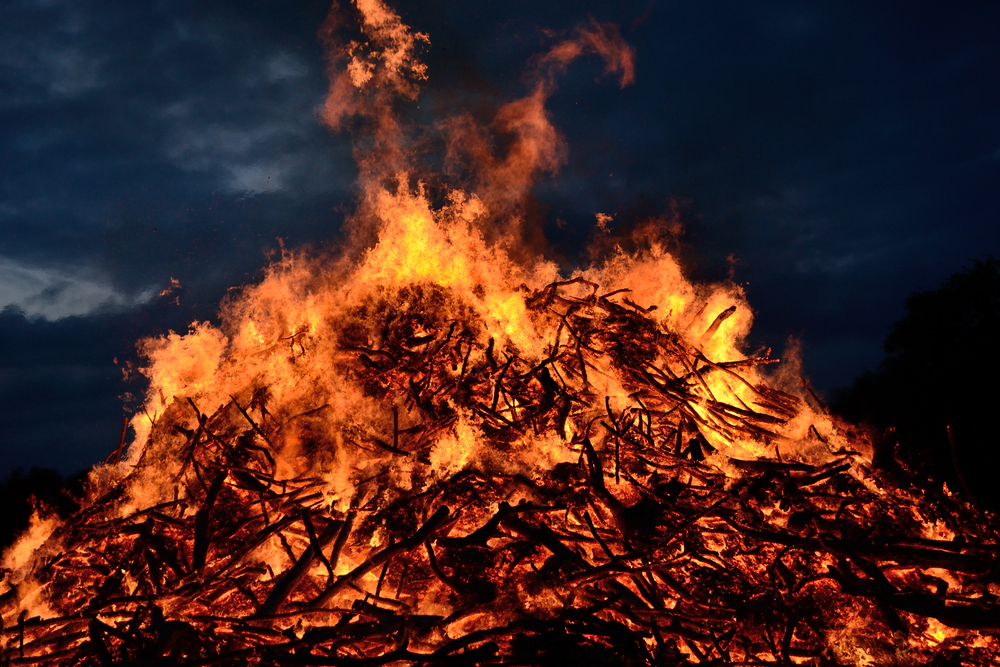I’d been in Neustadt for almost a year before I noticed the plaque. It’s not obvious: the metal is the same colour as the grey cobblestones around it and there is a vegetable stall on top of it three days a week. There is poetry engraved in it, but my German is so poor that I can only translate it bluntly:
This is where the National Socialists burned books, 1933
In 2008, on the 75th anniversary of the bonfires, my bohemian neighbour Hans hung a rainbow coloured flag out his window, listing the names of authors whose works had been torched: Thomas Mann, Bertold Brecht, Ernest Hemingway. Hans explained he did it so that nobody could become complacent about what had happened in Neustadt. He would force them to remember.
So vehement was he, that I slipped away rather than confess that I, too, have been a book burner.
It was the late 1990s and my first post-university job was to buy non-fiction for a mail order book club. I scanned publishing catalogues for books that might appeal to our customers and then had them imported and sold through our brochures. I was very high-minded at first, believing it was my duty to pick the best quality books and pay publishers a fair price for them, so they could publish more excellent books.
Actually, it was my job to pick bestsellers and screw publishers, usually by manipulating currency exchange rates. My high-mindedness didn’t survive the commercial reality long, because the books that sold the best were inevitably made-up history, of the sort that gave rise to the Da Vinci Code. I sat through sales meetings with editors forced to purge their lists of sub-performing authors, to make way for non books – little books of ‘wisdom’ or humour – that were certain to sell. The diamonds still got through, but as marketing departments became more important, they ruthlessly pruned the smaller books that weren’t destined for greatness, but which might have given quiet pleasure, or nurtured a fledgling author.
And so I bought an endless stream of bogus books, punctuated by some brilliant ones. Answerable for their sales, I was in trouble if I bought too many. Occasionally, I would schlepp books home. There they’d sit in a basket.
My low point in all of this was Kitty Kelley’s The Royals, a book that offended me, not because it mocked the royals, but because it was poorly written schlock. Worse, someone higher up had decided to order 20,000 copies on my behalf, taking up my available warehouse space.
Then Diana died. And, instantly, so did Kelley’s book. The Royals gave way to the first Diana Memorial Book – a huge coup for us, because we’d got hold of it first.
Diana died on a Sunday. One of our suppliers, quick to seize the moment, immediately had cars criss-crossing Britain, seeking paper and an available printer. Meanwhile, photos were dropped into electronic pages in London, as someone typed inane captions underneath. That night the presses began rolling, and the first books touched down in Australia on the Tuesday. We were among the first to offer them and they sold and sold and sold. But it also meant lots of leftover Kitty that I was stuck with. I was drowning in that bloody book.
I left the company soon after that. A year later, the books in my basket were still there. It was a freezing winter in Sydney and I lived in a drafty, unsealed house, whose only source of warmth was the fireplace. We were out of wood so… in went Kitty Kelley. And what a heroine she was, with her tough spine and her high quality papers, which burned for a full half hour. After her went some ‘aliens built the pyramids’ stuff, and then some quick-blazing books on chemical warfare. Over the next week, I also burned several diet books from my own shelf, and one on how to make money in shares. It felt very subversive and naughty. It was also a private gesture, whose aim wasn’t to stop anybody else from reading those books; in fact, I’d done my best to sell them. But talking to Hans has made me examine my conscience.
I’ve come to the conclusion that we need a world where book burning is possible, if only because of what it reveals about the burner. As soon as the Nazis began, not just to build book pyres, but to insist on them, there could be no doubt they were a regime bent on destruction.
So I find it interesting that Amazon’s electronic reader is called the Kindle. Physical books won’t disappear – the book is too perfect a device for that – but the future holds fewer of them. And that’s dangerous. Because when books become electronic, they can be quietly deleted. More prosaically, who would stop a bestselling author who wants to revise their work, and demands that all copies be ‘updated’? The technology to do that exists. We might find, if we’re not careful, that in our rush to digitise, we’re not just opening up new reading possibilities, but destroying old ones.
The Kindle, indeed.
A version of this article appeared in Good Reading magazine.




